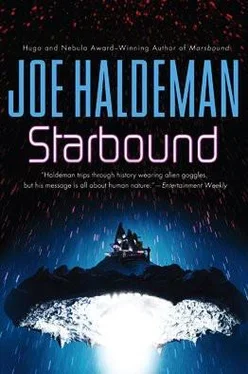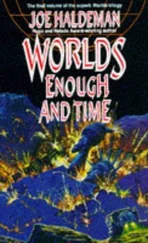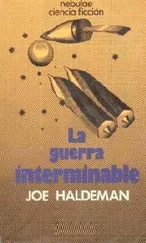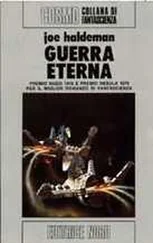It did. Red’s funeral pyre was bright enough to be seen light-years away, but only a few gamma rays leaked through.
Would the Others see the flare and assume that their little problem—the existence of the human race—had been solved?
That was not likely. We had to go to them.
Magic trumps science for most people, and wishful thinking drives a lot of decision-making. So a large and vocal fraction of the human race thought the best way to deal with the Others would be to lie low.
If we didn’t try to contact them and didn’t broadcast any signals into space—who needs to, since everybody has cable?—then the Others would think that their plan had worked, and so would leave us alone.
Of course there’s no cable between Earth and Mars, but the idea of abandoning Mars actually sounded pretty attractive to some, since without Mars none of this would have happened.
Then there was also the problem that we didn’t think to turn off all the transmitters right after the big explosion on the other side of the Moon, so it would be like closing the barn door long after the horse had trotted off to Wolf 25.
A different kind of logic asserted that we had better start building a defense against the Others right now . Assuming that the ship that left Triton couldn’t go faster than the speed of light, it would be more than twenty-four years before they got back home and found out Earth had survived, and a similar time before they came back.
A half century can be a long time in the evolution of weapons. Fifty years before Hiroshima, soldiers were still killing each other with bayonets and single-shot bolt-action rifles.
With unlimited energy, we could make our own planet- buster. And a starship to take it to them.
A lot of humans (and all Martians) thought that was a really bad idea. There was no reason to assume that what they did on Triton and the Moon represented the pinnacle of the Others’ ability to do damage. If we got them angry, they might flip a switch and blow up the Sun. They might send us all off to wherever the energy was coming from. Or some other place from which there would be no returning.
Meanwhile, the Earth’s various economic and political systems were trying to deal with the mixed blessing of free energy. It wasn’t quite literally free, since someone had to pay for the manufacture of an outlet. But there were dozens of factories, then hundreds, then one on every block, popping them out for pocket change. A black box with a knob and a place to plug in, for alternating current, or a couple of terminals, for DC. There were other ways to access different kinds of power—like the direct matter-to-energy inferno that would power ad Astra .
The consortium that had built the Space Elevator, which put things in orbit cheaply and made endeavors like the Martian colony possible, had grown into an enterprise that had an annual cash flow greater than all but the two wealthiest countries. It had a lot of influence on matters like whether or not to build a fleet of starships and go kick some alien butt. It could have made the largest profit in the history of commerce if it had decided to encourage that, but a version of sanity prevailed: it would only make a small fleet of warships, and leave it here in the solar system. And before it did anything aggressive, it would send a peace-seeking delegation to Wolf 25. Sacrificial lambs, some said, and of course its best- known public representative, “The Mars Girl” Carmen Dula, would be one of them. She was not thrilled by the idea.
6
EARTH AND MARS AND IN BETWEEN
None of us who had set foot in Mars was allowed to return to Earth. The logic was clear: until we knew why everyone of my generation and younger simultaneously came down with the Martian lung crap, there was no telling what other strange bugs we might harbor. So we’re all Typhoid Marys, until proven otherwise.
We could live in Earth orbit, though, inside a quarantined satellite, Little Mars. I commuted back and forth, Little Mars to Mars, on the one-gee shuttle, which (without spending months in free fall) took between two and five days. I was happier in Mars, and would have settled down there if the Corporation would have left me alone. See my kids often enough for them to remember my face.
In Little Mars, I could don a virtual-reality avatar and electronically walk around on Earth without infecting anyone. Usually my avatar looked like a twelve-year-old girl in shiny white tights who staggered a lot and ran into things, with my face and voice, kind of. When I visited Starhope, though, the spaceship factory, for some reason they gave me a male avatar. Six feet tall, broad-shouldered, glossy black. Still clumsy and a little dangerous to be around.
It was even more clumsy than the girlish avatar I was used to, because everything I did and said went through a censoring delay, in case I inadvertently said, “Hey, how are those warships coming along? The ones we’re going to use against the Others?”
It was a ribbon-cutting ceremony for the mostly symbolic completion of ad Astra , the ship we were eventually going to take to Wolf 25. All that was really complete, though, was the habitat, the living and working quarters for the crew of seven humans and two Martians. The ship itself was being built out in space, attached to the huge iceball that would provide enough reaction mass to go twenty-some light-years and back.
A miniature version of it was already well past the Oort Cloud, the theoretical edge of the solar system. It had more spartan quarters and the modest goal of going a hundredth of a light-year and back without exploding or otherwise wasting its test pilot.
Our ship would be reasonably comfortable, bigger than the John Carter , which had taken twenty-seven of us on an eight- month journey to Mars. We’d been weightless then, though; on our trip to the presumed home of the Others, we would be traveling at one-gee acceleration, once the ship got up to speed. Then turn around at the midway point and decelerate at the same rate.
Scattered among the merely real humans at the ceremony were eight avatars identical to mine, I guess standard issue at Starhope. One of them was Paul and two would be Moonboy and Meryl, the other two xenologists who were going with us. Maybe three of the others were the Corporation/UN team, who couldn’t be in Little Mars—no place to hide—but might have been in orbit somewhere. Or just in the next room, for that matter, their identities hidden.
(We’d never met face-to-face, but we had exchanged letters. Nice enough people, but a married threesome, two men and a woman, seemed odd to me. One man is hard enough to handle.)
I missed some of the oratory. It’s easy to fall into a drowse when you’re standing motionless in VR. If I missed something important, I could trivo it back.
Our mission was so vague I would be hard- pressed to write a speech about it more than a minute or two long—or shorter than a book. Go to the planet we think the Other went to, just to demonstrate that we could. Then react to whatever they do. If “whatever they do” includes vaporizing us, which doesn’t seem unlikely, then the fact that we didn’t try to harm them first will have been our default mission. Aren’t you sorry you killed us?
As soon as the ceremony was over, they started taking the habitat apart. It broke down into modules small enough to be lifted by the Space Elevator.
Once the habitat was delivered, Starhope would settle down into what would be its regular business for the next forty years: building warships.
It was a really stupid idea, since the Others had already demonstrated how easy it would be for them to destroy the Earth. Why aggravate them?
Читать дальше












